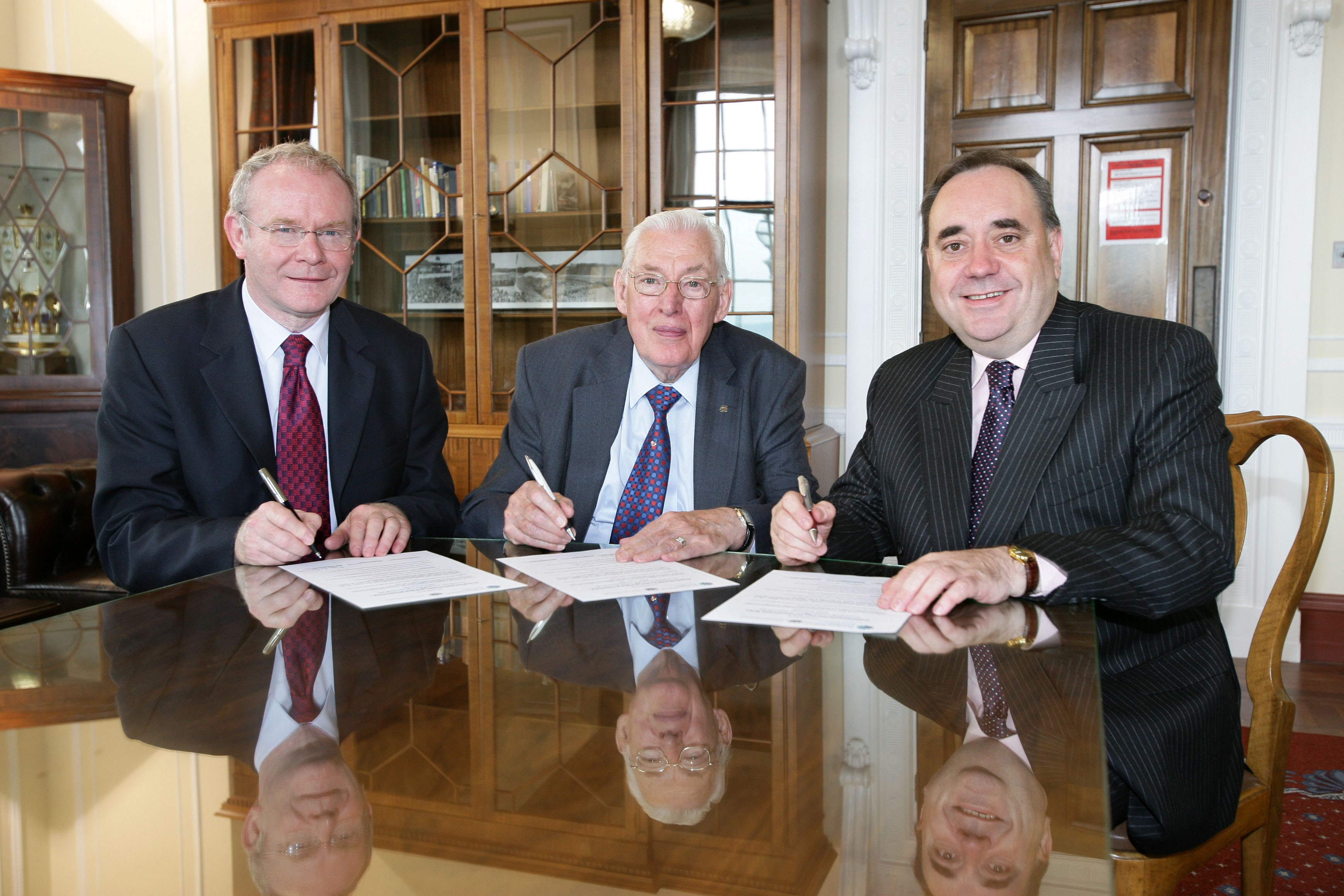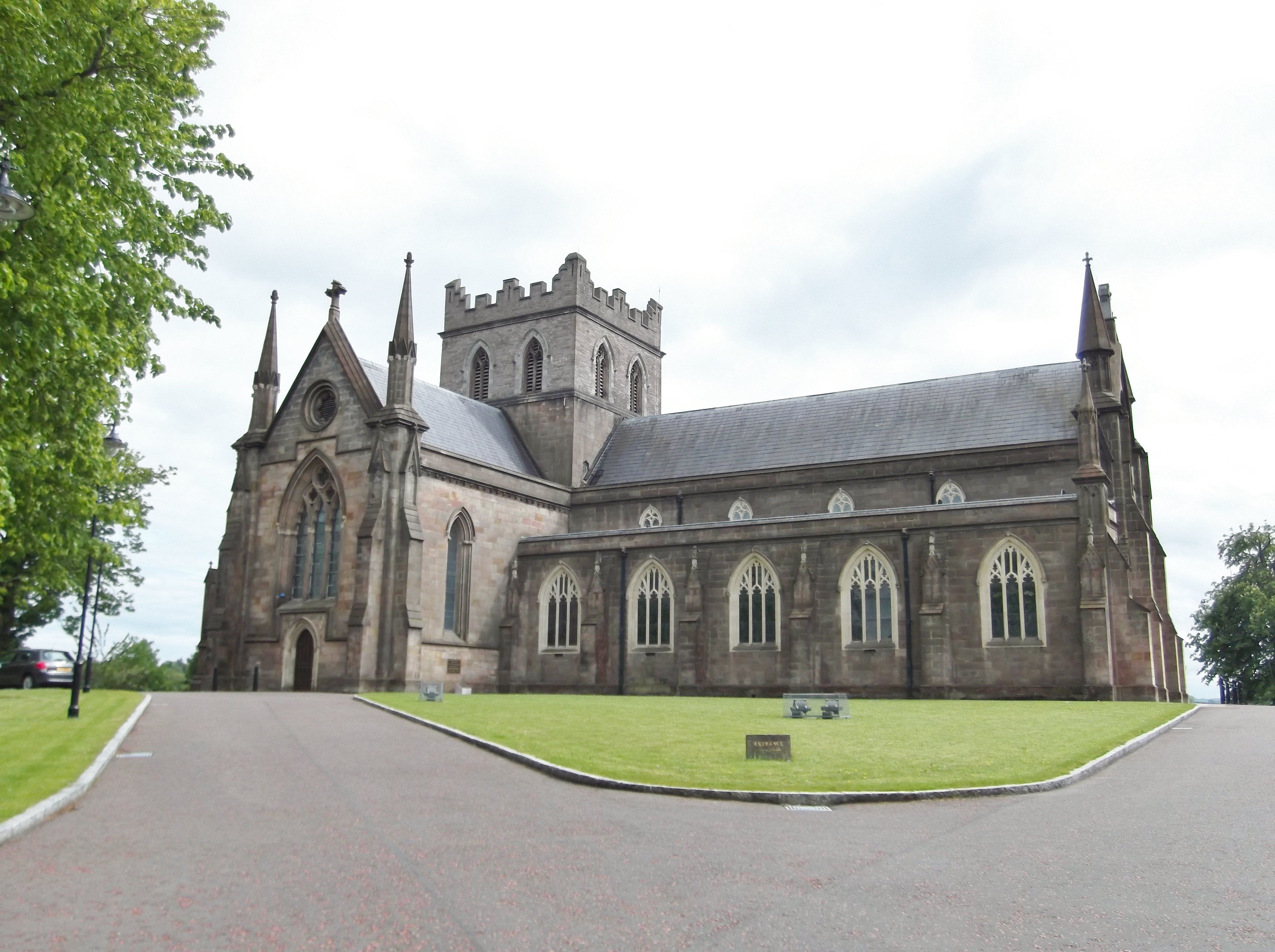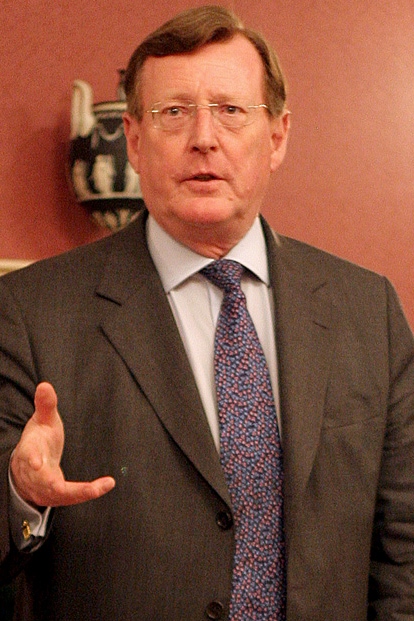|
Mark Durkan
Mark Durkan (born 26 June 1960) is a retired Irish nationalist politician from Northern Ireland. Durkan was the deputy First Minister of Northern Ireland from November 2001 to October 2002, and the Leader of the Social Democratic and Labour Party (SDLP) from 2001 to 2010. He contested the Dublin constituency for Fine Gael at the 2019 European Parliament election. Early life John Mark Durkan was born in Derry, County Londonderry; his father, Brendan, was a Royal Ulster Constabulary District Inspector in Armagh. He was raised by his mother, Isobel, after his father was killed in a road accident in 1961. He was educated at St. Patrick's Primary School and at St. Columb's College, where he was Head Boy. He studied politics at the Queen's University of Belfast (QUB), and later did a part-time postgraduate course in Public Policy Management with the University of Ulster at Magee. While at QUB Durkan served as Deputy President of Queen's Students' Union from 1982 to 1983. He was als ... [...More Info...] [...Related Items...] OR: [Wikipedia] [Google] [Baidu] |
|
 |
Deputy First Minister Of Northern Ireland
The First Minister and deputy First Minister of Northern Ireland are the joint heads of government of the Northern Ireland Executive and have overall responsibility for the running of the Executive Office. Despite the different titles for the two offices, the two positions have the same governmental power, resulting in a duumvirate; the deputy First Minister is not subordinate to the First Minister. Created under the terms of the 1998 Good Friday Agreement, both were initially nominated and appointed by members of the Northern Ireland Assembly on a joint ticket by a cross-community vote, using consociational principles. That process was changed following the 2006 St Andrews Agreement, meaning that the First Minister is nominated by the largest party overall, and the deputy First Minister is nominated by the largest party in the next largest community designation. On 17 June 2021, despite a letter from the Democratic Unionist Party chairman and other senior party members, DUP le ... [...More Info...] [...Related Items...] OR: [Wikipedia] [Google] [Baidu] |
 |
Northern Ireland
Northern Ireland ( ga, Tuaisceart Éireann ; sco, label=Ulster-Scots, Norlin Airlann) is a part of the United Kingdom, situated in the north-east of the island of Ireland, that is variously described as a country, province or region. Northern Ireland shares an open border to the south and west with the Republic of Ireland. In 2021, its population was 1,903,100, making up about 27% of Ireland's population and about 3% of the UK's population. The Northern Ireland Assembly (colloquially referred to as Stormont after its location), established by the Northern Ireland Act 1998, holds responsibility for a range of devolved policy matters, while other areas are reserved for the UK Government. Northern Ireland cooperates with the Republic of Ireland in several areas. Northern Ireland was created in May 1921, when Ireland was partitioned by the Government of Ireland Act 1920, creating a devolved government for the six northeastern counties. As was intended, Northern Irela ... [...More Info...] [...Related Items...] OR: [Wikipedia] [Google] [Baidu] |
 |
Queen's University Of Belfast
, mottoeng = For so much, what shall we give back? , top_free_label = , top_free = , top_free_label1 = , top_free1 = , top_free_label2 = , top_free2 = , established = , closed = , type = Public research university , parent = , affiliation = , religious_affiliation = , academic_affiliation = , endowment = £70.0 million , budget = £395.8 million , rector = , officer_in_charge = , chairman = , chairperson = , chancellor = Hillary Clinton , president = , vice-president = , superintendent = , vice_chancellor = Ian Greer , provost = , principal = , dean = , director = , head_label = , head = , academic_staff = 2,414 , administrative_staff = 1,489 , students = () , undergrad = () , postgrad = () , doctoral = , other = 2,250 (Colleges) , address = , city = Belfast , state = , province = , postalcode = , country = Northern Ireland , campus = Urban , language = , free_label = Newspaper , free = '' The ... [...More Info...] [...Related Items...] OR: [Wikipedia] [Google] [Baidu] |
 |
Armagh
Armagh ( ; ga, Ard Mhacha, , " Macha's height") is the county town of County Armagh and a city in Northern Ireland, as well as a civil parish. It is the ecclesiastical capital of Ireland – the seat of the Archbishops of Armagh, the Primates of All Ireland for both the Roman Catholic Church and the Church of Ireland. In ancient times, nearby Navan Fort (''Eamhain Mhacha'') was a pagan ceremonial site and one of the great royal capitals of Gaelic Ireland. Today, Armagh is home to two cathedrals (both named after Saint Patrick) and the Armagh Observatory, and is known for its Georgian architecture. Although classed as a medium-sized town, Armagh was given city status in 1994 and Lord Mayoralty status in 2012, both by Queen Elizabeth II. It had a population of 14,777 people in the 2011 Census. History Foundation ''Eamhain Mhacha'' (or Navan Fort), at the western edge of Armagh, was an ancient pagan ritual or ceremonial site. According to Irish mythology ... [...More Info...] [...Related Items...] OR: [Wikipedia] [Google] [Baidu] |
|
Royal Ulster Constabulary
The Royal Ulster Constabulary (RUC) was the police force in Northern Ireland from 1922 to 2001. It was founded on 1 June 1922 as a successor to the Royal Irish Constabulary (RIC) Richard Doherty, ''The Thin Green Line – The History of the Royal Ulster Constabulary GC'', pp. 5, 17, 27, 93, 134, 271; Pen & Sword Books; following the partition of Ireland. At its peak the force had around 8,500 officers, with a further 4,500 who were members of the RUC Reserve. The RUC policed Northern Ireland from the aftermath of the Irish War of Independence until after the turn of the 21st century, and played a major role in the Troubles between the 1960s and the 1990s. Due to the threat from the Provisional Irish Republican Army (IRA), who saw the RUC as enforcing British rule, the force was heavily armed and militarised. Officers routinely carried submachine guns and assault rifles, travelled in armoured vehicles, and were based in heavily-fortified police stations.Weitzer, Ronald. ''Pol ... [...More Info...] [...Related Items...] OR: [Wikipedia] [Google] [Baidu] |
|
 |
County Londonderry
County Londonderry (Ulster-Scots: ''Coontie Lunnonderrie''), also known as County Derry ( ga, Contae Dhoire), is one of the six counties of Northern Ireland, one of the thirty two counties of Ireland and one of the nine counties of Ulster. Before the partition of Ireland, it was one of the counties of the Kingdom of Ireland from 1613 onward and then of the United Kingdom after the Acts of Union 1800. Adjoining the north-west shore of Lough Neagh, the county covers an area of and today has a population of about 247,132. Since 1972, the counties in Northern Ireland, including Londonderry, have no longer been used by the state as part of the local administration. Following further reforms in 2015, the area is now governed under three different districts; Derry and Strabane, Causeway Coast and Glens and Mid-Ulster. Despite no longer being used for local government and administrative purposes, it is sometimes used in a cultural context in All-Ireland sporting and cult ... [...More Info...] [...Related Items...] OR: [Wikipedia] [Google] [Baidu] |
|
2019 European Parliament Election In Ireland
The 2019 European Parliament election in Ireland is the Irish component of the 2019 European Parliament election and was held on Friday, 24 May 2019, on the same day as the 2019 local elections and a referendum easing restrictions on divorce. The election was conducted in three constituencies under the single transferable vote (STV). Thirteen MEPs were elected, but the last candidate elected in both Dublin and South did not take their seats until after Brexit on 31 January 2020. Constituency changes The United Kingdom invoked Article 50 to withdraw from the European Union on 29 March 2017 following the 2016 referendum to leave the European Union. As Article 50 has a two-year period for withdrawal, the United Kingdom would not be part of the 2019 European Parliament election scheduled for May 2019. In July 2018, the European Council made a decision to redistribute a number of the seats from the United Kingdom to other member states. The allocation of MEPs from Ireland ... [...More Info...] [...Related Items...] OR: [Wikipedia] [Google] [Baidu] |
|
|
Dublin (European Parliament Constituency)
Dublin is a constituency of the European Parliament in Ireland. It elects 4 Members of the European Parliament (MEPs) using proportional representation by means of the single transferable vote (STV). History and boundaries The constituency was created in 1979 for the first direct elections to the European Parliament. From 1979 to 1994, it comprised County Dublin and the city of Dublin. Since 1994 it comprises the same area redefined as the counties of Dún Laoghaire–Rathdown, Fingal, South Dublin and the city of Dublin. From 1979 to 2004, it elected 4 MEPs; this was reduced to 3 for the 2009 election. For the 2019 European Parliament election, a reapportionment following Brexit and the loss of 73 MEPs from the United Kingdom gave two additional seats to Ireland. Following a recommendation of the Constituency Commission, Dublin gained an extra seat, from 3 to 4. However, the last candidate elected did not take his seat until after the United Kingdom withdrew from the Eur ... [...More Info...] [...Related Items...] OR: [Wikipedia] [Google] [Baidu] |
|
 |
Deputy First Minister Of Northern Ireland
The First Minister and deputy First Minister of Northern Ireland are the joint heads of government of the Northern Ireland Executive and have overall responsibility for the running of the Executive Office. Despite the different titles for the two offices, the two positions have the same governmental power, resulting in a duumvirate; the deputy First Minister is not subordinate to the First Minister. Created under the terms of the 1998 Good Friday Agreement, both were initially nominated and appointed by members of the Northern Ireland Assembly on a joint ticket by a cross-community vote, using consociational principles. That process was changed following the 2006 St Andrews Agreement, meaning that the First Minister is nominated by the largest party overall, and the deputy First Minister is nominated by the largest party in the next largest community designation. On 17 June 2021, despite a letter from the Democratic Unionist Party chairman and other senior party members, DUP le ... [...More Info...] [...Related Items...] OR: [Wikipedia] [Google] [Baidu] |
|
University Of Ulster
sco, Ulstèr Universitie , image = Ulster University coat of arms.png , caption = , motto_lang = , mottoeng = , latin_name = Universitas Ulidiae , established = 1865 – Magee College 1953 - Magee University 1982 – University of Ulster (remains official name) 2014 – Ulster University , type = Public research university , endowment = £14.365 million (2018) , budget = £185 million , chancellor = Colin Davidson , vice_chancellor = Paul Bartholomew , faculty = 1,665 , students = () , undergrad = () , postgrad = () , city = Belfast, Coleraine, Jordanstown, Derry, London, Birmingham , affiliations = * European University Association * Association of Commonwealth Universities * Universities UK * Universities Ireland , coordinates = , campus = Varied (urban/ rural) , colours = ''Logo'': Navy blue & bronze '' ... [...More Info...] [...Related Items...] OR: [Wikipedia] [Google] [Baidu] |
|
 |
Queen's University Belfast
, mottoeng = For so much, what shall we give back? , top_free_label = , top_free = , top_free_label1 = , top_free1 = , top_free_label2 = , top_free2 = , established = , closed = , type = Public research university , parent = , affiliation = , religious_affiliation = , academic_affiliation = , endowment = £70.0 million , budget = £395.8 million , rector = , officer_in_charge = , chairman = , chairperson = , chancellor = Hillary Clinton , president = , vice-president = , superintendent = , vice_chancellor = Ian Greer , provost = , principal = , dean = , director = , head_label = , head = , academic_staff = 2,414 , administrative_staff = 1,489 , students = () , undergrad = () , postgrad = () , doctoral = , other = 2,250 (Colleges) , address = , city = Belfast , state = , province = , postalcode = , country = Northern Ireland , campus = Urban , language = , free_label = Newspaper , free = '' The ... [...More Info...] [...Related Items...] OR: [Wikipedia] [Google] [Baidu] |
|
Mark H
Mark may refer to: Currency * Bosnia and Herzegovina convertible mark, the currency of Bosnia and Herzegovina * East German mark, the currency of the German Democratic Republic * Estonian mark, the currency of Estonia between 1918 and 1927 * Finnish markka ( sv, finsk mark, links=no), the currency of Finland from 1860 until 28 February 2002 * Mark (currency), a currency or unit of account in many nations * Polish mark ( pl, marka polska, links=no), the currency of the Kingdom of Poland and of the Republic of Poland between 1917 and 1924 German * Deutsche Mark, the official currency of West Germany from 1948 until 1990 and later the unified Germany from 1990 until 2002 * German gold mark, the currency used in the German Empire from 1873 to 1914 * German Papiermark, the German currency from 4 August 1914 * German rentenmark, a currency issued on 15 November 1923 to stop the hyperinflation of 1922 and 1923 in Weimar Germany * Lodz Ghetto mark, a special currency for Lodz Ghe ... [...More Info...] [...Related Items...] OR: [Wikipedia] [Google] [Baidu] |